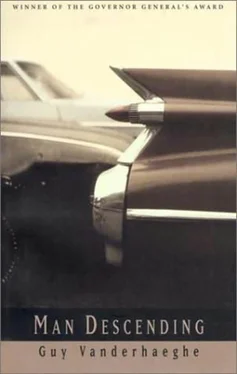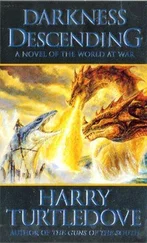“Victoria,” I say, “I am serious.”
“This is stupid and childish, Ed. I don’t want any part of it. It is just another one of your games. It doesn’t mean anything.”
“Victoria, don’t you see,” I say seductively, “this is your way out? The easy way to get me out of your life?”
“Not to mention my bathroom.”
“I can change, Victoria. I can.”
“You want a test, do you?” she asks, and there is a touch of both malice and glee in her voice.
“Yes.”
“You had your laugh for the past six years, Ed. But he who laughs last laughs best. Okay. I want you to finish the River Run, Ed. All twelve and a half miles.”
“Good God, Victoria, you don’t want to test me. You want to kill me. What does that have to do with love and fidelity and things like that?”
“Take it or leave it.”
I have no choice. Faint hope stirs in my chivalric breast. An ordeal. I fling open the door and attempt to embrace her. I am repulsed.
“You goddamn madman,” she says, turning on her heel. “I need a drink.”
“Don’t bother pouring me one,” I call after her. “From this moment henceforward I am in training.”
Two days later and at last I am determined to sally forth on my adventure. I debated this for a long time. On Tuesday I thought I was coming down with one of those horrible summer colds. Wednesday I devoted to mental preparation. But this morning a zealous Ed awoke.
I energetically yank on a pair of cutoffs, lace up my dirty sneakers and amble out to be greeted by birdsong from the fine old elm on the boulevard. I begin to run. For two blocks I plod along feeling heavy, ponderous, doughy. I stop and walk for a bit to recover my wind. In a short time I realize that I’m not going to begin to run again. It is a stupid way to prove a point. Twelve and a half miles? She has misunderstood me. That wasn’t what I was talking about. It was love I was speaking of, and in a moment of poetic rhapsody she bound me with mundane specificities. Love is never having to run twelve and a half miles. Love is offering to. But only a piker accepts.
I sit down on the curb and watch the traffic flow by for half an hour. Victoria’s unfairness angers me. I brood. It feels like it may rain, so I go back to the apartment.
The minute I step inside the door it hits me. There are dirty dishes crusted with old goop littering the table and kitchen counter. The bedroom smells stale and the bed looks like a rat’s nest. There are long hairs in the bathroom sink and a ring in the tub so substantial that honesty compels me to describe it as a ledge.
This is my mess. The visible excreta of the life I have led in the last few months. The door to the medicine cabinet hangs carelessly open on its hinges, the way I had left it the night before. I punch it, shatter the mirror and cut my knuckles. Trailing droplets of blood, I go back to the kitchen.
“Fuck it,” I say. “Fuck this life. Fuck these plates.” Three of which I smash in the sink, shards dancing up to patter on the wall and floor.
I sit down on a kitchen chair and feel my hand throb and stiffen. It can’t be escaped any more. For months I have held Victoria responsible for the way I live. I have held her responsible because it didn’t take me long to discover that I didn’t manage well on my own.
But there is no avoiding it. It may seem an obvious point – but those dirty dishes are mine. It is my filth in the bathroom. And I am living this crazy goddamn life stuck in neutral. All this is my mess, not Victoria’s.
And I admit to myself that I am scared because I realized I must sink or swim. I am afraid because Victoria isn’t here to prod and cajole me over the rough spots any longer. This is my rough spot.
And suddenly, for whatever reason, I think at this minute of my old humpbacked cigar-puffing Dane. Perhaps because my first memories of him are associated with feelings of aggrievement and persecution. My introduction to him was by way of a philosophy professor who was a demanding, half-crazed German who belonged in nineteenth-century Heidelberg rather than a North American university of the sixties. Whenever we malingered or bitched about the work load, he would repeat to us one of Kierkegaard’s entries from his journal.
“There is nothing everyone is so afraid of as being told how vastly much he is capable of. You are capable of – do you want to know? – you are capable of living in poverty; you are capable of standing almost any kind of maltreatment, abuse, etc. But you do not wish to know about it, isn’t that so? You would be furious with him who told you so, and only call that person your friend who bolsters you in saying: ‘No, this I cannot bear, this is beyond my strength, etc.’ ”
He would announce this sternly to us and then add with Teutonic glumness, “I refuze to be a valze vriend. I will stretch you.”
I have one of my rare charitable thoughts. Perhaps Victoria has done me the favour of telling me I can stand alone. Perhaps she has done me the favour of making me bear the stink of my own loneliness.
And so I get to my feet and go back down into the street. I think of Soren taunted and jeered at in the streets of Copenhagen. I take heart from his observation that “one is tempted to ask whether there is a single man left ready, for once, to commit an outrageous folly.” And Sam too. I don’t forget Sam and what he suffered and how he overcame the odds.
I begin to shuffle down the street, muttering through my teeth, telling myself the story.
“After they struck him with coup sticks and quirts they stripped off every bit of his clothing and took away his boots. The old scars on his body, the puckered, ridged hole on his shoulder from a bullet he had caught at Antietam, the sabre scar on his belly, turned blue in the cold April wind.
“Looking Glass indicated he could begin to walk. The young bucks expectantly fingered their lances and edged forward, impatient at the restraints imposed by their chief. But Looking Glass had set the trial and conditions. They dared not defy him. Sam Waters would be unarmed and naked, but he would be given a hundred-yard head start before the braves were loosed in pursuit.
“Twenty yards out Sam spat grimly. What the hell? he thought. He paused and waggled his bare ass derisively at his captors. There was a howl of rage. ‘Huh sutkis weepa hupka, kaksakis nuhka!’ he taunted them in their own tongue. Let’s play dog. You sniff my ass and I’ll growl.
“On he walked, hardly aware of the bedlam he had created. He didn’t feel the cold. He was preoccupied only with making the river three long miles away. He marshalled his strength. In a moment, he would be running for his life. Running barefooted across sharp rocks that would slash his feet, and cacti that would lodge their wicked needles in his flesh. He would have to disregard the pain and press on. And when he reached the icy river, running fast with snow melt and whirling with ice cakes, he would have to plunge in and allow the current to sweep his exhausted body downriver either to his death or to salvation.”
I scrape along past the neighbourhood Texaco station where I buy my gas. Ernie the pump jockey waves to me.
“When Sam heard the whoops behind him he sped away. He didn’t look behind. He didn’t need to. Sam knew the lithe, ochre-streaked bodies were hot on his heels, closing fast, trying to get into range for a spear cast that would bring down the great Bull Head, the white warrior.”
Past the shopping mall. A young matron pauses from loading her grocery bags in the trunk to watch me go by. Does she imagine that I am pursued by Brass Pot, Trader Bell and Wakshee, and does she know they are gaining on me? I pick up the pace.
“A spent lance skittered off the rocks by his legs. Sam’s energy was flagging. His lungs burned, his chest heaved, sweat coursed down his brow into his eyes. He glanced down at his feet. A bloody pulp.
Читать дальше












